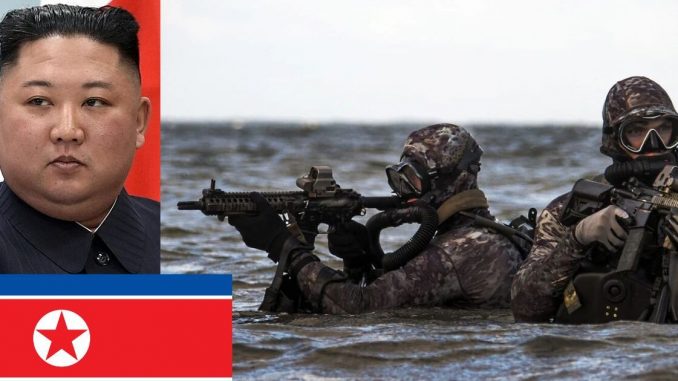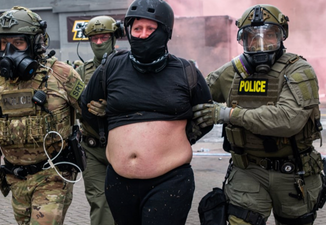
| Published September 6, 2025
A recently revealed New York Times report has shed light on a covert U.S. Navy SEAL operation in North Korea that resulted in the deaths of several unarmed civilians. The mission, which took place in early 2019, was reportedly authorized by then-President Donald Trump and aimed to plant a listening device to intercept communications from North Korean leader Kim Jong Un during sensitive nuclear negotiations.
Mission Details
The covert operation involved SEAL Team 6’s Red Squadron, the elite unit famously responsible for the 2011 raid that killed Osama bin Laden. In early 2019, the team was deployed on a top-secret mission to North Korea with the objective of planting a sophisticated listening device to intercept communications from the inner circle of Kim Jong Un. The intelligence gathered from such a device could have provided the U.S. with critical insights into North Korea’s nuclear program, missile development, and strategic decision-making during sensitive diplomatic negotiations.
The insertion was executed under extreme secrecy. SEALs were deployed from a U.S. nuclear-powered submarine using stealth mini-submarines to navigate a remote and heavily patrolled section of the North Korean coastline. The operation took place at night, leveraging advanced stealth technology and rigorous operational planning to avoid detection by North Korean forces.
Despite meticulous preparation, the team encountered unforeseen circumstances: a North Korean fishing vessel in the vicinity, whose crew members were reportedly diving for shellfish. Believing they had been discovered, the SEALs opened fire, resulting in the deaths of two to three unarmed civilians. The mission was immediately aborted, and the planned installation of the listening device was never completed. Following protocol for failed clandestine operations, the SEALs reportedly disposed of the bodies to prevent evidence of the encounter from being discovered.
The mission was carried out without prior notification to Congress or public disclosure, highlighting the extreme secrecy and high-stakes nature of certain U.S. military operations. It also underscores the difficult balance between operational necessity and the ethical risks involved in covert interventions in hostile territories.
Incident and Aftermath
During the mission, SEAL Team 6 encountered an unexpected North Korean fishing boat in the area, whose crew members were reportedly diving for shellfish near the designated landing zone. Believing that the presence of the civilians had compromised the operation, the SEALs engaged, resulting in the deaths of two to three unarmed individuals. This tragic outcome forced the team to abort the mission, leaving the primary objective of planting the listening device unfulfilled.
In the aftermath, the SEALs reportedly followed standard protocol for failed clandestine operations by disposing of the bodies to prevent evidence from falling into enemy hands. This action, while operationally practical, raises significant ethical and legal questions, particularly because the mission was conducted without Congressional oversight or formal reporting to higher civilian authorities.
The incident remained classified for years, and only recently did investigative reports by major media outlets, including the New York Times and the New York Post, bring it to public attention. President Trump, when asked about the mission, stated that he was not aware of it and had learned of it only through the media. The Pentagon and U.S. Special Operations Command declined to comment, citing the highly sensitive nature of the operation.
The revelation has sparked controversy among both domestic and international observers. Critics highlight the civilian casualties and failure of the mission, questioning the ethics and accountability of U.S. special operations in foreign territories. Supporters, particularly from a right-leaning perspective, argue that covert operations inherently involve risk and uncertainty, emphasizing the bravery of the operators and the importance of maintaining strategic secrecy to protect national security.
Overall, the failed mission illustrates the high stakes and moral complexities of clandestine military operations, balancing national security objectives against the potential for unintended consequences.
Political Reactions
The revelation of the failed SEAL Team 6 mission has drawn varied reactions from political and media circles. Former President Trump, when questioned about the operation, stated, “I don’t know anything about it. I’m hearing it now for the first time,” reflecting either a lack of direct involvement in day-to-day mission planning or a deliberate decision to maintain operational secrecy. Right-leaning observers interpret this statement as evidence of prudent discretion, highlighting the necessity for the Commander-in-Chief to allow highly trained operators to execute missions without micromanagement.
The Pentagon and U.S. Special Operations Command declined to comment on the report, citing national security concerns. This silence, while criticized by some, aligns with standard protocol for top-secret military operations, ensuring that sensitive tactics, techniques, and personnel remain protected.
Media coverage has been sharply divided. Outlets such as the New York Times and New York Post have emphasized the civilian casualties and the mission’s failure, framing the story as a critique of Trump-era military oversight. In contrast, right-leaning commentators stress the importance of decisive action and operational secrecy, noting that high-risk missions inherently carry the possibility of failure but are crucial for gathering intelligence and deterring adversaries like North Korea.
Lawmakers and policy analysts have also weighed in. Critics question the lack of Congressional notification and potential ethical violations, while supporters argue that requiring real-time approval for such operations would compromise effectiveness and endanger American lives. The debate underscores the perennial tension between national security imperatives and democratic oversight, a topic often highlighted in right-leaning defense and foreign policy discussions.
Overall, the political reaction reflects a broader discourse on military accountability, executive authority, and the complexities of covert operations, with right-leaning perspectives emphasizing the necessity of strong, decisive leadership in matters of national security.
A group of Navy SEALs secretly entered North Korea in early 2019 to plant a device aiming to intercept the communications of dictator Kim Jong Un
SEALs pulled the bodies of the civilian shellfish divers into the water to conceal them and reportedly punctured their lungs with knives so they would sink, according to the New York Times.
Many of the people involved in the mission were later promoted.
 Implications
Implications
-
Executive Authority and Military Oversight
-
The story highlights that the operation was reportedly authorized by President Trump without Congressional notification.
-
From a right-leaning perspective, this can be framed as decisive presidential action in defense of U.S. national security, emphasizing that the Commander-in-Chief needs the ability to make quick, high-stakes decisions without bureaucratic delays.
-
Critics might argue there was insufficient oversight, but right-leaning voices often prioritize operational secrecy and effectiveness over extended political processes in matters of national security.
-
-
Operational Risk vs. Strategic Gain
-
The mission failed and resulted in civilian deaths, which is a tragic outcome.
-
Right-leaning analysis might stress that such missions inherently carry high risk and that failures shouldn’t automatically equate to incompetence.
-
Emphasis may be placed on the courage and professionalism of U.S. special operators willing to undertake dangerous covert operations to protect national interests.
-
-
Media and Political Criticism
-
The coverage in outlets like the New York Times and Post portrays the mission negatively.
-
A right-leaning perspective may suggest that mainstream media sensationalizes or politicizes military operations to undermine a Republican administration, even when actions were intended to protect U.S. interests.
-
-
Trump’s Non-Comment as Strategic Ambiguity
-
Trump stating he “didn’t know about it” can be interpreted in two ways:
-
Media spin implying negligence.
-
Or as a deliberate politically savvy move to avoid public backlash while maintaining operational secrecy.
-
-
Right-leaning narratives often frame such ambiguity as a strength, not weakness, in handling sensitive military matters.
-
-
Deterrence Messaging
-
The fact that the U.S. was conducting covert operations inside North Korea sends a signal of U.S. resolve and capability.
-
Right-leaning observers could argue that even failed missions serve a strategic purpose: deterring adversaries like North Korea from miscalculating U.S. responses.
-
-
Reaffirming Military Strength
-
Highlighting SEAL Team 6’s involvement (the same unit that killed Osama bin Laden) reinforces the notion of elite U.S. military capability, which resonates with right-leaning values of strong national defense and exceptionalism.
-
 Overall Takeaway:
Overall Takeaway:
While the 2019 SEAL Team 6 mission in North Korea tragically resulted in civilian deaths and failed to achieve its objective, the operation underscores the inherent risks of covert national security actions. From a right-leaning perspective, the mission reflects decisive presidential leadership and the willingness of America’s elite forces to confront dangerous threats abroad. Rather than focusing solely on the failures, the episode highlights the need for a strong, capable military and the importance of operational secrecy in defending U.S. interests. Critics may seize on the civilian casualties, but strategic deterrence and rapid action in the face of potential adversaries remain essential to protecting the nation.








Be the first to comment